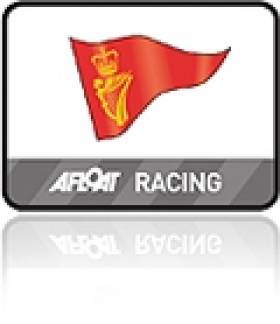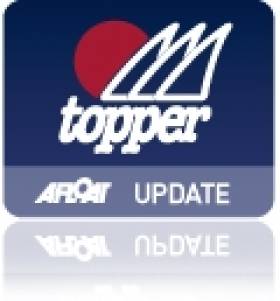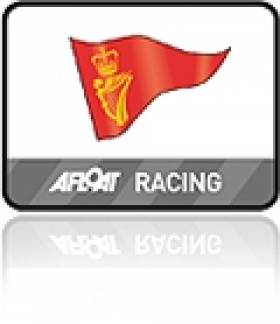Displaying items by tag: Crosbie
Crosbie's 'No Excuse' Awarded Royal Cork's Boat of the Year Prize
#ROYAL CORK YACHT CLUB – A leading Munster sailing figure has been deservedly recognised for his contribution to sailing.
Ted Crosbie with his Neils Jeppesen-designed X-yacht 'No Excuse' was awarded the Royal Cork Yacht Club's 'Boat of the Year' trophy at the recent Crosshaven prizegiving.
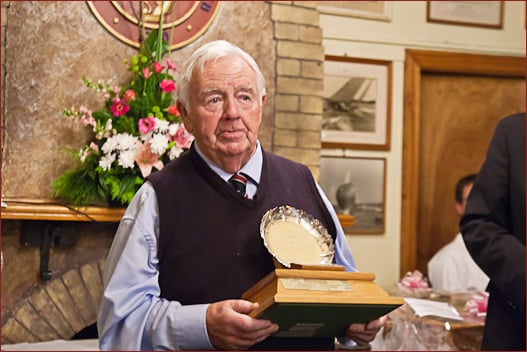
Former Club Admiral Ted Crosbie lifts RCYC's Boat of the Year Award for 2011. Photo: Bob Bateman
15 year old Matt Venables from Sutton Coal Fields Yacht Club in Birmingham proved that he is a potential Olympian with his dominant win of the very successful Sovereign Ski Topper World Championships which finished in Dun Laoghaire today writes Martin McCarthy.
The youngster led from the second race on day 1 and was comfortably in front by the time Race OOD Con Murphy finished the third race of the day.
Matt was delighted with his win: "The whole event has been amazing – I have enjoyed every minute of it. The set up here and the organization has been fantastic – the courses were superb and it was great that we got all our races in despite a lot of light airs"
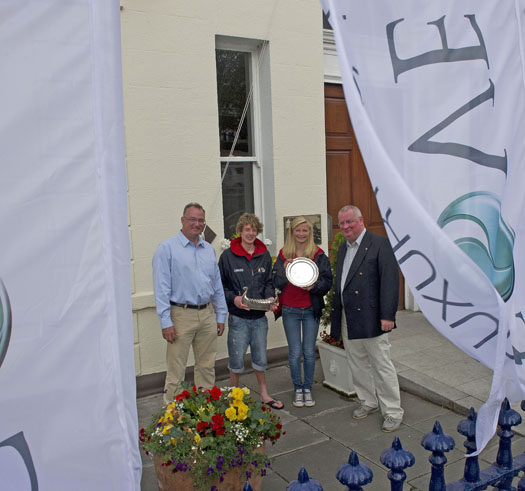
National Yacht Club Commodore Paul Barrington, who doubled as Event safety officer, was impressed with the huge fleet's behaviour: "The sailors showed great rule adherence – especially as they are all under 18 – but they also really entered into the right spirit for the event." The five dolphins who joined the later races also seemed to be enjoying the fun of the occasion.
This spirit was what also struck Event Chairman Margaret Kneafsey: "There was great friendliness in the fleet despite the fierce competitiveness. They all seemed to enjoy themselves no matter where they finished"
Top of the Irish was Patrick Crosbie of RCYC who finished a brilliant third out of the 177 boat fleet. He said it was one of the most enjoyable events he has ever done. He will only have tonight to rest before heading to Wales to compete in the British 420 Nationals in North Wales where he is teaming up with his sister.
Strangford's Laura Gilmore also had a terrific championship finishing fifth overall and is now the best female Topper sailor in the world.
The 5 man Korean team added a true global flavour to the Dun Laoghire event. Their manager Mr.Lee felt they leant a great deal from the Dun Laoghaire event as they will host the 2013 Topper World's: "It was great for our boys to sail against the world's best and we were proud that one got into the silver fleet. Staying in UCD worked very well as the boys could play football in the evenings with Irish and British boys and I think they will have friends for life from that". He also remarked that the Harbour Company providing the Carlisle Pier for Camper vans added greatly to the atmosphere and spirit of the event.
Phil Harland adds: Sailors arrived for the final day of the 2011 Sovereign Ski Topper World Championship at the National Yacht Club in Dun Laoghaire, Ireland to be greeted by yet another day of calm seas and no wind. Those fervently looking at the forecasts were predicting some big winds coming over around 11:00am with a front of rain, but having arrived an hour early at the club based on yesterday's forecast of wind in the morning there were a few weary faces around the dinghy park.
Launching was delayed as the wind stubbornly refused to get going, and then at 10:00am a gentle breeze rustled through. There was rumour of 20 knot winds just down the coast at Wicklow as the PRO gave the decision to launch and the sailors took to the water in eager anticipation. Once again launching was completed quickly and efficiently. As the wind started to fill in, Gold fleet went into sequence at 10:50, which ended in a general recall. Second time around though they were clean away with a big pin end bias as the wind shifted.
Silver fleet got away cleanly with three Irish boats port tacking the fleet off the biased pin end. Bronze fleet were also finally away, though a bit of a messy start in the shifting wind. As the Silver fleet rounded their windward mark a few spots of rain started falling out on the course, and the wind dropped – now averaging less than 5 knots much to the frustrations of the sailors who had been expecting it get stronger through the day! The tide was still ripping through and with little wind the Bronze fleet was moving very slowly towards the windward mark and having great difficulty getting around it.
Meanwhile, the Gold fleet, who had been sailing in the best of the breeze, were completing their first race of the day. Eventually Silver and Bronze fleets completed their course. Fleet winners for the first race of the day were: Gold – Danielle Rowe (GBR); Silver – Lewis Marr (GBR); Bronze – Oliver Martindale (GBR).
The wind increased again slightly, but the rumoured winds over Wicklow hadn't made it to Dun Laoghaire! Before the start of Race 2, a wind shift to the right left the PRO no option but to lay a new course before getting Gold fleet away cleanly for Race 2. However, yet another wind shift meant the PRO had to raise the AP for Silver and Bronze fleets. After a short delay Silver went into sequence and eventually after another general recall they got away under a black flag followed by the Bronze fleet. The wind speed out on the race course climbed to 7 knots – which was to prove the best conditions of the day, other than the odd isolated gust.
Fleet winners for the second race of the day were: Gold – Matt Venables (GBR); Silver – Samuel McKay (GBR); Bronze – Fionn O'Farrell (IRL).
The final race of the championship saw Gold fleet away followed by a general recall for Silver fleet and finally Bronze fleet. As the Bronze fleet completed their final race the rain started falling lightly again and the wind dropped off – the strong winds never came for racing, but as often happens started blowing through the boat park as the boats were being packed away! To round off the day, the fleet winners for the third race were: Gold – Robbie Robinson (GBR); Silver – Georgia Grice (GBR); Bronze – Thomas Moore (IRL).
After five days of racing in challenging and sometimes frustrating conditions consisting of mainly light and shifty winds coupled with a strong tide, Matt Venables (GBR) proved the man to catch, in the end finishing 33 points ahead of his nearest rival and taking an obligatory dive into the water on his way in to the slip. Laura Gilmore (GBR) came home 1st female.
The top three in each fleet were:
Gold fleet: 1st – Matt Venables (GBR); 2nd – Robbie Robinson (GBR); 3rd – Patrick Crosbie (IRL);
Silver fleet: 1st – Joe Henderson (GBR); 2nd – Samantha Foster (GBR); 3rd – Samuel McKay (GBR);
Bronze fleet: 1st – Thomas Moore (IRL); 2nd – Conrad Parkinson (GBR); 3rd – Oliver Martindale (GBR);
During the closing speeches, Bill Brassington, President of the International Topper Class Association, announced that the 2012 Topper World Championship will be held at the Sailing Club Workum, in the Netherlands, from August 19th to the 24th. For 2013 the World Championship will travel to the beautiful island of Namhae in South Korea and for 2014 back to the UK and the waters of Tremadog Bay and the Lyn peninsular, hosted by Clwb Hwylio Pwllheli Sailing Club.
No Excuses for Overall Winner Crosbie in IRC 2
To top the evening off, it was nice to see the National 18 crews enjoying themselves outside the Club Bar (after a busy day of racing) while we were motoring up the river!
On the results front:
White Sail IRC Tom McNiece's Sigma 33 "Minx 111" got the number 1 slot last night and also got first in the League.
White Sail Echo Micheal Lynch's Sun Odyssey 32i "Lady T" got the number 1 slot last night and also first in the League.
Class 3 IRC Jimmy Nyhan & Maritta Buwalda's 1/4 tonner "Outrigger" got the four bullets in the League including last night, what a performance! They were also first overall in Echo.
Class 3 Echo Paul Murray's Impala "Prometheus" got the number 1 slot last night.
Class 2 IRC Ted Crosbie's X302 "No Excuse" had an excellent race last night coming first and first overall.
Class 2 Echo Derry Nash's First 31.7 "Catalpa" came first overall.
Class 2 Echo Mark Mendell's Sun fast 32 "Wicked" got the number 1 slot last night
Class 1 IRC Kieran Twomey's Corby "Gloves Off" came first overall.
Class 1 IRC Donal O'Leary's X35 "D-Tox" got the number 1 slot last night.
Class 1 Echo Frank Doyle's A35 "End Game" came first overall.
Class 1 Echo Aidan Heffernan's Dehler 36 "Indulgence" got the number one slot last night.



























